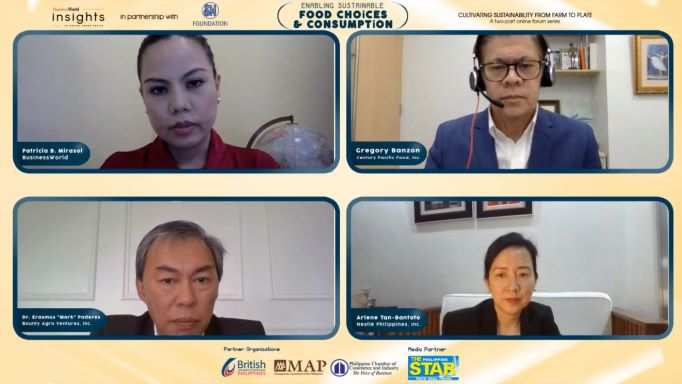Sustainability in food choices and practices

By Chelsey Keith P. Ignacio, Special Features Writer
As wellness and sustainability have increased their value among many people nowadays, the foods available and to be consumed also matter more.
In a BusinessWorld Insights held on Oct. 20, leaders from large food companies in the Philippines showed their endeavors to produce healthier food options for Filipinos. The online forum, titled “Enabling Sustainable Food Choices and Consumption,” also called for affordability and education about nutritious foods.
Gregory H. Banzon, executive vice-president and chief operating officer at Century Food Pacific, Inc., shared that they currently work on enhancing the nutritional value of their products, given that they are probably among the main sources of Omega-3 and DHA and that three of their core categories are part of the six key critical household items defined by the Department of Social Welfare and Development.
“Realizing the importance of our brands and products in food security, we will endeavor to improve the nutritional values of the products that we are serving,” Mr. Banzon said.
“We not only measure our performance in terms of revenue, volume, and profit. One of the key measures that we are also looking at is delivery of key nutritional requirements of the country.”
The food company’s market leader brands, Century and Argentina, are continuously being improved in terms of nutritional quality like reducing sodium.
It also works on going into categories that provide health and wellness benefits to the consumers through its dairy and coconut product brand entries.
Mr. Banzon also presented Century Pacific Food’s recently launched unMEAT, its entry to the plant-based category.
“It is good all-around in terms of [being] better for you, given the many benefits in terms of nutritional value — high in fiber, a high source of protein, and cholesterol-free,” he shared. “But it’s not only good for you; it’s also good for the planet.”
Nestlé Philippines also works on improving the nutrition of its food products, as shared by Arlene Tan-Bantoto, the food and beverage company’s head for corporate affairs, communication, and sustainability.
“We aim to ensure that we provide our consumers with nutritious, delicious, and healthier options that are grown and produced responsibly,” Ms.Tan-Bantoto said.
The food and beverage company continuously enhances its products through micronutrient fortification and reduction of sugar.
According to Ms. Tan-Bantoto, they have served 25 billion fortified products in 2020 alone, with the help of partnerships including Nestlé Research in Switzerland and the Food and Nutrition Research Institute in addressing iron deficiency anemia.
Nestlé’s Milo also has its sugar amount deducted. The company now also offers Milo Zero Added Sugar Ready and Milo with less than one gram of sugar.
The company is pursuing plant-based options in the country as well through its Harvest Gourmet, which provides an array of vegan and vegetarian options, especially for out-of-home consumption.
“As a global leader in food and beverage, we will champion the pursuit of sustainable food choices and consumption. We do not have all the answers and solutions today. And that is why we look forward to finding the solutions together,” Ms. Tan-Bantoto said.
Bounty Agro Ventures, Inc. (BAVI), meanwhile, seeks to produce affordable and healthy broiler meat for consumers.
“BAVI is consistently looking for ways to innovate and give Filipinos healthier and more sustainable food choices,” said Dr. Erasmus “Mark” Paderes, its senior vice-president for animal health and field mill operations.
Dr. Paderes stressed the importance of cautious antibiotics usage for chickens. He reminded Alexander Fleming’s warning 76 years ago that it is not difficult to make microbes resistant to penicillin. He also cited a 2016 study projecting 10 million deaths by 2050 could be a result of failing to address the problem of antibiotic resistance.
“Anti-microbial resistance or AMR is a global crisis,” he said. “All sectors must work together to address this challenge.”
In 2017, BAVI became the pioneer of the no antibiotic ever chicken production system in the Philippines. The company has been able to cut the use of antibiotics by 84%.
“We only use antibiotics prudently. That is when the flock or the broilers have bacterial diseases, which the veterinarians diagnose. If it is due to bacterial disease, then we will have to use antibiotics. Our veterinarians are using prescriptions to monitor and track its usage and effect,” Dr. Paderes explained.
“We also follow proper withdrawal period to ensure that all the treated birds from farms that were affected by a disease will not go to the consumer with antibiotic residue.”
“Those products go to our unbranded market segment. Because in live operation, broiler farming, there will always be an exception. Some farms will have a bacterial disease and we have to treat them for animal welfare.”
“Good animal husbandry practices, animal welfare, hazard analysis and critical control points, and prudent use of anti-microbials are very important for responsible and sustainable food production,” Dr. Paderes also noted.
Affordability and education
While producing healthier food options are vital responsibility of food companies, making nutritious products affordable and educating consumers about good consumption are also imperative.
Given that majority of the Filipino population is at the base of the socio-economic pyramid, Mr. Banzon of Century Pacific Foods underlined the need to provide affordable nutrition.
“As food companies, we need to be able to do more and better for the consumer by way of enhancing the nutritional value of our products, but keeping them affordable,” he said.
In this duty, Mr. Banzon believed that a partnership between the private sector and government was needed to figure out how to incentivize companies making ‘better for you, better for the planet’ products.
Mr. Banzon also highlighted the need for educating consumers, especially kids, on healthier products and being conscious about waste. Because if kids see food companies doing their part on plastic neutrality and enhancing their manufacturing output, it can be ingrained in their practices.
“You really need to educate consumers and kids over the long term to be very conscious about food waste and quality of nutrition,” he said.
Ms. Tan-Bantoto of Nestlé Philippines likewise emphasized the significance of educating the people about proper nutrition and consumption.
“When you are two years old and your mom decides to add sugar to your milk or juice, the taste palette goes on. And it takes a while [for] the mindset to say, ‘I want to live a healthier life because I know it is not good to keep on adding sugar,'” she said.
Educating consumers about segregation is also a must, according to Ms. Tan-Bantoto, to properly handle single-use plastic packages.
“We know that 80% of the consumers really cannot afford more expensive or big or upsize [products]. That is why they only go to a sari-sari store. But [what] they can do to save is start segregating,” she said.
“Education again plays a very critical role and also government and private collaboration to teach our consumers to segregate.”
Nestlé Philippines has been pushing for a circular economy and helping educate children, parents, and teachers on the value of nutrition, health, and wellness, shared by Ms. Tan-Bantoto. “We are committed to making sustainable and healthier food choices accessible to Filipino and will continue to promote responsible consumption for the health of the people and the environment. We will do so by helping to generate knowledge and understanding and by educating consumers.”
This session of #BUSINESSWORLDINSIGHTS was presented by SM Foundation and was supported by British Chamber of Commerce of the Philippines, Management Association of the Philippines, Philippine Chamber of Commerce and Industry, and The Philippine STAR.



